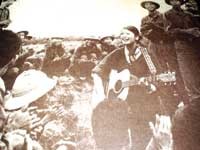Anti-war song sparks three-decade quest

In 1972, with the aim of bolstering the invasion of
However, the move came up against fierce opposition from people in
Ballad of peace: Kumiko entertains soldiers on the battlefront in the
A young Japanese singer named Yokio Kumiko penned an anthem for the protest called Stop the Tanks. The song proclaimed:
Tanks could not go, could not cross this city
Tanks are not allowed to turn their guns to Vietnamese children
Tanks should not point guns to
Youths stand up to fight for peace.
In late 1973, the song was played over and over again on the Voice of Viet Nam Radio and the Ha Noi Radio. It eventually reached the ears of a paralysed 14-year-old girl named Tran Thi Phuong Lien. While she only heard the song once, it touched off a personal quest that would last three decades and shape the rest of her life.
Song of protest
Even though she did not understand Japanese, the melody of the song touched Lien’s mind and heart and inspired her to learn Japanese.
Following the country’s liberation in 1975, Lien followed her parents back to
Whenever Lien met a Japanese she asked them about the song and the singer. But the tune was now 30 years old and no one could tell her who sung it.
Ray of hope
While she was downcast, Lien didn’t stop seeking the singer.
Then, good fortune struck. In November 2005, she accompanied a Vietnamese delegation to
A professor from
Ballad of peace: Kumiko entertains soldiers on the battlefront in the province of Quang Binh in 1973. — VNS File Photos
Lien wrote her in May 2006. "I was extremely happy and I immediately sent her an email about my life and connection with the song," she recalled in May. 
She got a reply almost immediately.
The letter said: "Lien, friend, this has moved me to tears. I wish to have the chance to meet you Lien san. I am strongly convinced such a chance will come and surely I will perform that song again for you. Please wait. And take care until then."
Kumiko was known as a singer with great love for peace and for
She performed Stop the Tanks at Ha Noi’s Hong Ha Theatre and in the central province of
After the war, she performed several times in
Tearful meeting
A year after the email exchange, in early May of this year, Kumiko came to
"It was really a dream come true," said Lien. "Her song and her voice changed my life, even though I heard it just once more than 30 years ago."
The feeling was mutual.
"I did not think my first performance in
Together, the pair visited Agent Orange victims at Hoa Binh (Peace) Village in
They showed Kumiko with guitar in hand singing for soldiers on the Quang Binh battlefield, regaling patients in Ha Noi’s
"I was 29 that year. I sang but my heart had a knife-like pain because the soldiers were so young. Young but they had to take guns to fight for their nation’s liberation," she said, pointing to the picture on Quang Binh battlefield in 1973.
"I had at that time a strong belief that my Vietnamese friends would win."






